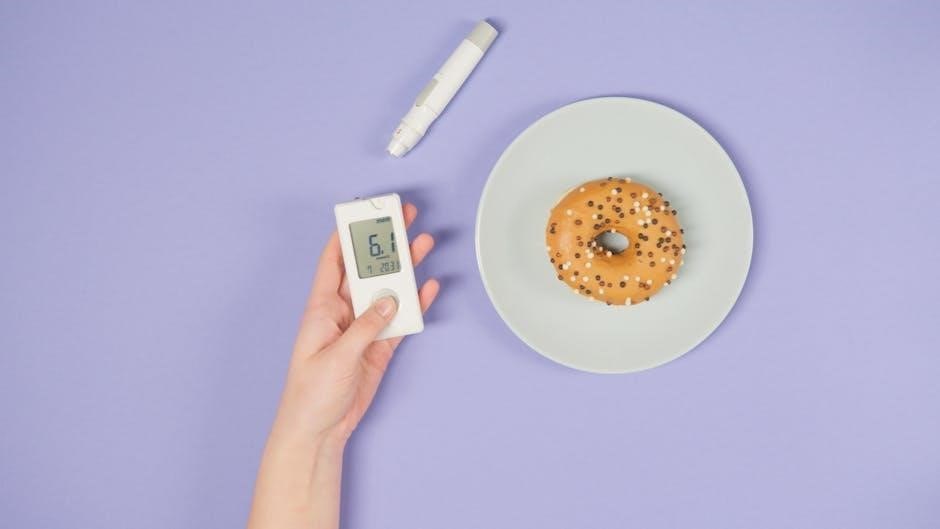
hormone balancing diet plan pdf
A hormone balancing diet plan focuses on resetting hormones through nutrient-rich foods, promoting overall health and well-being. This structured approach helps regulate hormonal functions, improve energy levels, and support metabolic balance. By incorporating key foods and lifestyle changes, individuals can achieve a healthier hormonal state. The plan often includes a downloadable PDF guide, offering a comprehensive roadmap to sustainable hormonal health.
Overview of Hormone Balance and Its Importance
Hormone balance is crucial for maintaining overall health, as hormones regulate bodily functions like metabolism, energy, and reproductive processes. Imbalances can lead to issues such as fatigue, weight gain, and mood swings. A well-balanced diet plays a vital role in supporting hormonal health by providing essential nutrients, reducing inflammation, and promoting detoxification. Foods rich in vitamins, minerals, and antioxidants help stabilize hormone production, while avoiding processed sugars and unhealthy fats can prevent disruptions. Achieving hormone balance not only improves physical well-being but also enhances mental clarity and emotional stability, making it a cornerstone of long-term health and vitality.
Key Foods for Hormone Balance
Leafy greens, berries, nuts, seeds, fatty fish, and sweet potatoes are essential for hormone balance, providing vitamins, minerals, and antioxidants that support hormonal health and well-being naturally.

Protein-Rich Foods for Hormone Production
Protein-rich foods are vital for hormone production, as they provide essential amino acids needed to synthesize hormones like insulin, growth hormone, and sex hormones. Lean meats such as chicken and turkey are excellent sources of protein. Fatty fish like salmon and mackerel not only provide protein but also contain omega-3 fatty acids, which support hormonal balance. Eggs are another versatile and protein-dense option, offering an array of nutrients. Plant-based proteins like lentils, chickpeas, and quinoa are also beneficial, especially for those following a vegetarian diet. Including these protein-rich foods in your diet supports hormonal health and overall well-being.
Healthy Fats and Omega-3 Sources
Healthy fats, particularly omega-3 fatty acids, play a crucial role in hormone production and balance. Fatty fish like salmon, mackerel, and sardines are rich in omega-3s, which reduce inflammation and support hormone synthesis. Nuts and seeds, such as flaxseeds, chia seeds, and walnuts, are also excellent sources of omega-3s and provide essential nutrients for hormonal health. Avocados and olive oil are additional sources of healthy fats that promote balanced hormones. Incorporating these foods into your diet helps regulate hormones, improve brain function, and reduce inflammation, all of which are essential for maintaining hormonal equilibrium and overall well-being. These fats are a cornerstone of a hormone-balancing diet plan.
Fiber-Rich Foods for Digestive Health
Fiber-rich foods are essential for maintaining digestive health, which directly supports hormone balance. Vegetables like broccoli, cauliflower, and Brussels sprouts are high in fiber and contain compounds that aid in detoxification. Leafy greens, such as spinach and kale, also provide fiber and nutrients that promote healthy digestion. Whole grains like quinoa, brown rice, and oats are excellent sources of dietary fiber. Legumes, including lentils and chickpeas, are rich in fiber and protein, making them a great addition to a hormone-balancing diet. Fiber helps eliminate excess hormones, preventing their reabsorption, and supports the growth of beneficial gut bacteria, which is crucial for overall hormonal health. Incorporating these foods ensures a balanced digestive system and optimal hormone function.
Hydration and Its Role in Hormone Regulation
Hydration plays a vital role in hormone regulation by supporting the body’s ability to produce, transport, and eliminate hormones. Drinking enough water helps maintain cellular hydration, which is essential for hormone synthesis and function. Even mild dehydration can disrupt hormone balance, leading to fatigue, mood swings, and metabolic issues. Aim to drink at least half your body weight in ounces of water daily, adjusting for activity levels and climate. Incorporate hydrating foods like cucumbers, watermelon, and celery, and avoid sugary drinks that dehydrate the body. Proper hydration also aids in digestion and the removal of toxins, further supporting hormonal health and overall well-being.

Supplements for Hormone Support
Supplements like omega-3 fatty acids, magnesium, and vitamin D support hormone production and balance. Herbal options such as maca root and ashwagandha may also aid in regulating hormones naturally.
Vitamins and Minerals for Hormone Health
Vitamins and minerals are essential for maintaining hormone balance. Vitamin D supports thyroid function and hormone regulation, while magnesium aids in hormone production and energy metabolism. Zinc is crucial for insulin and testosterone balance, and iodine is vital for thyroid hormone synthesis. B vitamins, especially B12, play a key role in neurotransmitter production, impacting mood and hormonal balance. Incorporating these nutrients through diet or supplements can help restore and maintain optimal hormone levels, ensuring overall health and well-being. Always consult a healthcare provider before starting any supplementation to tailor it to your specific needs.
Herbal Supplements for Hormonal Balance
Herbal supplements can support hormonal balance naturally. Maca root helps regulate hormones, particularly for women, improving energy and mood. Schisandra berry supports adrenal function and overall hormonal equilibrium. Ashwagandha reduces stress and promotes thyroid health, while turmeric aids in inflammation reduction, which can disrupt hormones. These herbs can be consumed as teas, capsules, or added to meals. Always consult a healthcare provider before starting any new supplement regimen to ensure safety and effectiveness for your specific needs. Incorporating these herbs into your diet can complement a hormone-balancing lifestyle, promoting long-term wellness and hormonal harmony.

Sample 7-Day Hormone Balancing Meal Plan
This structured plan provides balanced meals, including hormone-balancing smoothies, omega-3 rich fish, and healthy carbs, ensuring nutrient-rich options to support hormonal health throughout the week.
Breakfast Options for Hormone Balance
Starting your day with a nutrient-dense breakfast is crucial for hormonal health. A Hormone-Balancing Smoothie made with frozen berries, spinach, flaxseeds, chia seeds, and almond milk provides essential vitamins and fiber. Protein-rich options like scrambled eggs with avocado or a Greek yogurt parfait with nuts and seeds support hormone production. Incorporating omega-3-rich foods, such as walnuts or flaxseeds, helps reduce inflammation. Hydration is key, so consider adding a glass of lemon water or herbal tea. Avoid sugary foods and opt for whole, unprocessed ingredients to maintain stable blood sugar levels and promote hormonal equilibrium throughout the day. These breakfast choices lay a strong foundation for a balanced diet.
Lunch and Dinner Ideas for Hormonal Health
Lunch and dinner play a vital role in maintaining hormonal equilibrium. Incorporate lean proteins like grilled chicken, turkey, or fish, paired with fiber-rich vegetables such as broccoli, Brussels sprouts, or leafy greens. Healthy fats like avocado, olive oil, and nuts support hormone production. Quinoa, brown rice, and sweet potatoes are excellent whole grain options. Consider a grilled chicken salad with mixed greens, avocado, and a lemon vinaigrette, or baked salmon with asparagus and quinoa. Avoid processed foods and opt for organic, seasonal ingredients to minimize toxin exposure. Staying hydrated with herbal teas or water and ensuring portion control are key for balanced meals. These meals provide sustained energy and support hormonal stability throughout the day.

Lifestyle Factors for Hormone Balance
Regular physical activity, adequate sleep, and stress management are essential for hormonal equilibrium. Exercise promotes endorphin release, while sufficient sleep supports hormone regulation. Avoiding smoking, alcohol, and excessive caffeine further aids balance. Incorporating mindfulness practices like meditation or yoga can reduce cortisol levels, fostering a healthier hormonal environment. Aligning daily routines with natural circadian rhythms also supports overall well-being and hormonal stability.
Exercise and Sleep for Hormonal Health
Regular physical activity and sufficient sleep are critical for maintaining hormonal balance. Exercise, such as aerobic workouts and strength training, helps regulate hormones like insulin, growth hormone, and cortisol. It also improves metabolism and energy levels. Similarly, adequate sleep is essential for hormone production and balance, with most adults needing 7-9 hours per night. Poor sleep quality can disrupt hormones, leading to issues like weight gain and mood swings. Incorporating a consistent sleep schedule and stress-reducing activities, such as yoga or meditation, can further support hormonal health. Balancing exercise and sleep creates a foundation for overall well-being and long-term hormonal stability.
Stress Management Techniques
Stress management is crucial for maintaining hormonal balance, as chronic stress disrupts hormones like cortisol and insulin. Techniques such as deep breathing exercises, yoga, and meditation can help reduce stress levels. These practices promote relaxation and stabilize hormonal fluctuations. Additionally, incorporating activities like reading, walking, or listening to music can provide emotional relief. Time management and setting realistic goals also help alleviate stress. Prioritizing self-care and engaging in hobbies can further support hormonal health. By adopting these strategies, individuals can better manage stress and create a balanced environment for their hormones to function optimally. Consistency in these practices is key to long-term hormonal well-being.
Adopting a hormone balancing diet plan is a powerful step toward achieving hormonal harmony and overall wellness. By focusing on nutrient-rich foods, staying hydrated, and incorporating supplements, individuals can reset their hormonal balance. Consistency is key to seeing lasting results. Next steps include continuing the diet, monitoring progress, and adjusting as needed. Regular exercise, adequate sleep, and stress management should also remain priorities. For sustained success, consider consulting a healthcare provider to tailor the plan to specific needs. Remember, small, consistent changes lead to significant long-term benefits. Download the complete PDF guide to access detailed meal plans and additional resources for a balanced lifestyle.